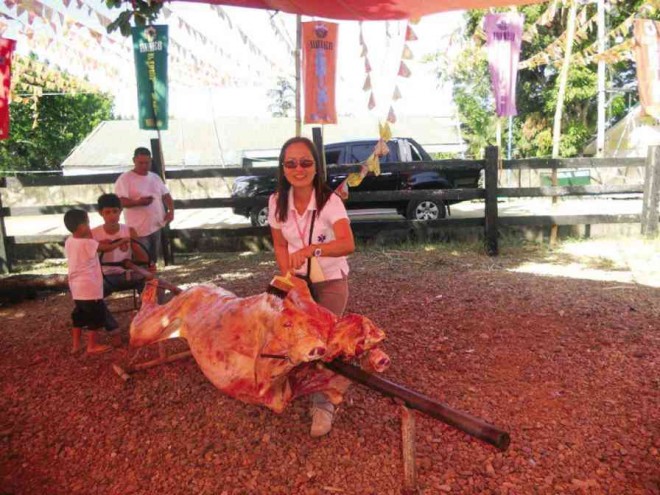Masbate cattle raisers go organic

ROASTER Mary Jane Dalanon, one of the primary manufacturers of beef products in Masbate, with a roasted cow during the recent Rodeo Masbateño to showcase the quality of beef produced in Masbate province. CONTRIBUTED PHOTO
Beef manufacturer Mary Jane Dalanon is curious about how the “new” Masbate cattle meat will taste compared with the beef she now processes to make her products.
Dalanon, 41, owner of the largest beef products store in Masbate province, usually buys native cattle from ranches in Masbate City and nearby towns because the organic farming techniques employed by farmers and cattle raisers give Masbate beef a distinct succulent taste.
Now that the Department of Agriculture (DA) has turned over a mini liquid nitrogen plant to the local government of Masbate, the businesswoman is anxious to know whether the cattle to be produced through artificial insemination (AI) will be of better quality than what Masbate farmers and cattle raisers produce.
More than the prospect of a better income, her concern is getting the meat that will continue to meet consumers’ standards, she said.
City Mayor Rowena Tuason said the nitrogen plant would help ranch owners and cattle raisers to produce better quality beef by allowing them to store genetic material or semen that they selected from their best specimens for cattle breeding.
Article continues after this advertisementThe P6.5-million facility at Masbate Fish Complex and Bus Terminal has begun selling buckets of liquid nitrogen worth P80 each to cattle raisers to store cattle semen in preparation for AI exclusively performed by city veterinarians.
Article continues after this advertisementUpgrade
It was constructed by the DA through a memorandum of agreement with the city government as part of the national government’s AI program to improve native cattle and meat and dairy production.
Tuason said the mini nitrogen plant would also upgrade the quality of goat and carabao meat.
Local cattle ranchers have been cross-breeding native cows with foreign breeds by buying genetic material from Australia, but the practice could sometimes cost more than the profit, according to Tuason.
“Now that we have our own nitrogen plant, our cattle raisers could already improve their specimens without transporting the cow outside Masbate to subject them to artificial insemination,” she said.
The cattle ranchers and other farm animal breeders are allowed to store the semen of their best specimens at the nitrogen plant, she said.
The local governments in Masbate could also produce more cows to disperse to small farmers raising cash crops like grain and rice, who would become direct beneficiaries of city efforts to further increase meat production, Tuason said.
Under the city government’s program, for example, the small farmers and their families would fatten up and breed through AI the heads of cattle they would receive from the local government until the animals have matured enough to be bred with other cows or sold to the market.
The farmer who raised the cattle will be paid by the local government unit (LGU) proportionate to the weight the animal gained since it was handed to them.
Should the cattle be used as a breeder, the farmer can benefit from the offspring because the LGU would also pay for it.
Consumer preference
“We will encourage that these cattle born via artificial insemination be bred because they would produce offspring of more profitable, higher quality,” Tuason said.
Dalanon said her clients particularly prefer Masbate beef because the cattle that produce them are raised entirely on organic farming.
Her store, MJ Beef Products, has been supplying various meat products since 1998 like beef tapa, corned beef and new product beef flakes—a favorite among visiting overseas workers.
Tuason said cattle raisers in Masbate developed several organic techniques to produce and augment certain attributes in meat, such as increased tenderness, by allowing cows to graze freely on meadows with various species of grass.
They have also experimented with cross-breeding foreign breeds of cattle like the Brangus, which is the resulting offspring of a cross between a Brahman cow from New Zealand and an Angus cow from Australia, she said.
She added that a cross like the Brangus beef is valued at P3,000 per kilo. Brangus cow meat, she said, is tastier and more succulent than the beef produced separately by these cows.
“We expect that cattle produced from crossing breeds conveniently via artificial insemination would bring in more profit to our farmers and would ultimately increase Masbate’s production,” she said.
Tuason said the mini nitrogen plant would enable the province to meet its target of becoming the largest producer of organically grown beef in the Philippines by 2020.